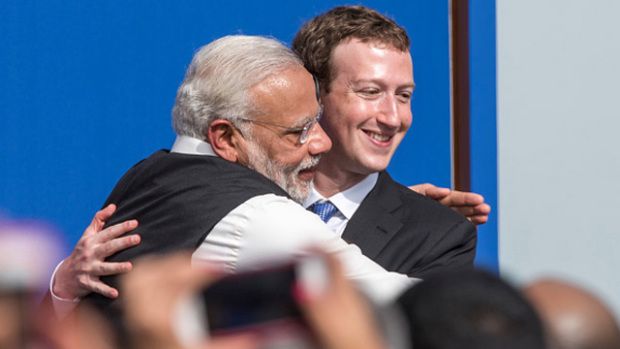
This weekend, Indian Prime Minister Narendra Modi met with the biggest tech companies in Silicon Valley. Google, Facebook, and Tesla were among those jostling for the Asian premier's attention, and a bevy of new announcements have followed — underscoring the growing importance of the Indian market to the American tech titans.
Of course, there have been efforts underway to tap into India's 1.25-billion-plus citizens (and other developing economies) by tech companies for years now. One of the most high-profile is Internet.org, a cross-company initiative led by Facebook's Mark Zuckerberg. It aims to bring cheap internet to emerging markets.
The reasoning behind this push is obvious: Every new internet user is a new potential customer. Connecting the unconnected is "not all altruism," Zuckerberg said over the weekend (in relation to project to bring internet to refugee camps). "We all benefit when we are more connected."
Modi's visit to California this weekend comes hot on the heels of a trip by the Chinese president, Xi Jinping. But relationships between American companies and China can be strained by the latter's authoritarian policies — Google does not current operate in mainland China.
In contrast, the New York Times reported, Modi "was on a charm offensive during his own American tour." At a town hall event held with Facebook, the Prime Minister teared up as he discussed his mother. Zuckerberg also shared details of his own spiritual journey to India at the urging of Steve Jobs.
While in Silicon Valley, he also visited the offices of Google and attended a dinner with the likes of Microsoft CEO Satya Nadella and 350 other business leaders. Tim Cook, CEO of Apple, visited Modi at his hotel, Reuters reports.
We're now seeing a bevy of announcements from tech companies attempting to capitalize of this visit. Google, for example, says it will install Wi-Fi in 400 train stations across the country. More ambitiously, Microsoft plans to bring cheap broadband internet to 500,000 villages across the country.
There are still hurdles to overcome, however — Along with basic connectivity, the language barrier being a key one.
Only one in six Indians knows enough English to surf the web in the language. But there are few web pages in Hindi or India’s 21 other official languages. “There are more web pages in Estonian than in Hindi,” Mr. Menon said.
Still, India has vast potential — an untapped well of hundreds of millions of new internet users. American tech companies are taking note.
"(India) has moved on from scriptures to satellites," Modi said this weekend, according to Reuters. "The world has started to believe that the twenty-first century belongs to India."
Ask us about our FREE financial advice program: ![]()
Other Top Stories:
Technical Analysis Lesson 1 - Introduction
How I Made Over $30,000 a Year by Investing in Binary Options
Follow us and SHARE this story on Facebook: ![]()


